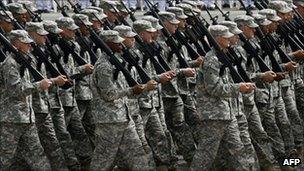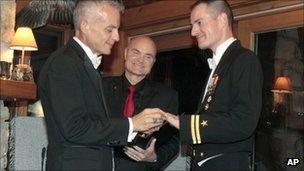'Don't ask, don't tell' ban on gays in US military ends
- Published

The Pentagon said it was fully prepared for the repeal of "don't ask, don't tell"
A policy banning open homosexuality in the US military has been repealed after nearly two decades.
The dropping of "don't ask, don't tell" means service members can now reveal they are gay without fear of investigation or discharge.
"Repeal Day" parties have been organised across the country to mark the victory for gay rights.
The US Congress voted last year to repeal the law, which was introduced in 1993 under the Clinton administration.
It replaced an outright ban on gay people serving in the military.
'Huge step'
Under the policy, gay people were permitted to serve as long as they did not openly acknowledge their sexual orientation, while commanders were not allowed to ask.

Navy Lt Gary Ross, right, and Dan Swezy exchange wedding vows, as the repeal takes effect
In Vermont, Navy Lt Gary Ross and his partner of 11 years, Dan Swezy, exchanged wedding vows after midnight, as the repeal took effect.
"Today is about every man and women in uniform, regardless of how they identify themselves," said Joint Chiefs of Staff chairman Admiral Mike Mullen in a news conference on Tuesday.
"The heart of the issue for me is the integrity of the institution," Adm Mullen said. "Seeing this change is a huge step in the right direction to be consistent with that value."
Defence secretary Leon Panetta told reporters that he was committed to removing "all of barriers that would prevent American from serving their country, and from rising to the highest level of responsibility that their talents warrant".
US President Barack Obama in a statement: "As of today, patriotic Americans in uniform will no longer have to lie about who they are in order to serve the country they love."
He added that the US military had taken "another great step toward keeping our military the finest in the world and toward fulfilling our nation's founding ideals".
The armed forces have been accepting applications from openly gay recruits for a number of weeks and will begin processing them now that the new law has taken effect.
Revised regulations
The military has also published a revised set of regulations, without references to any ban against homosexual service members.
Those who have been discharged under the don't ask, don't tell rule are entitled to re-enlist.
But existing standards of personal conduct, such as those pertaining to public displays of affection, will not change.
Nor will there be any change to the eligibility standards for military benefits.
Under current rules, service members are allowed to choose a partner as care-giver under the Wounded Warrior programme, or as a life insurance beneficiary.
Some in Congress remain opposed to repeal, arguing it could undermine efficiency and discipline in the military.
After the Don't Ask Don't Tell Repeal Act was passed by Congress last December, Mr Obama, Mr Panetta and Adm Mullen certified that allowing openly gay service members would not undermine the military.
- Published20 September 2011